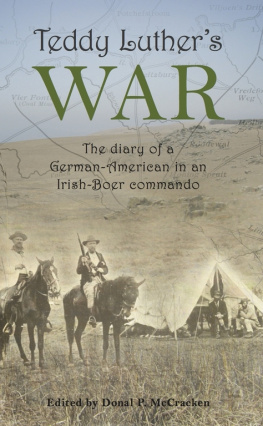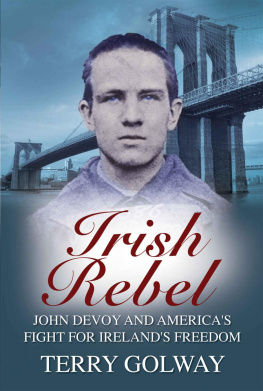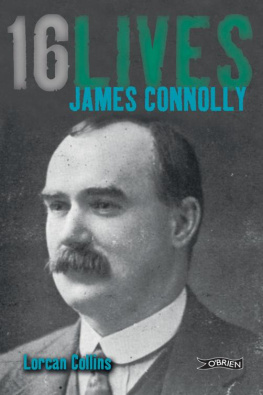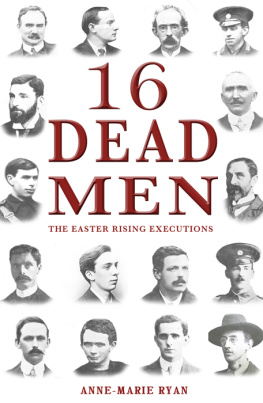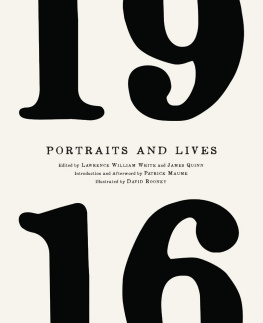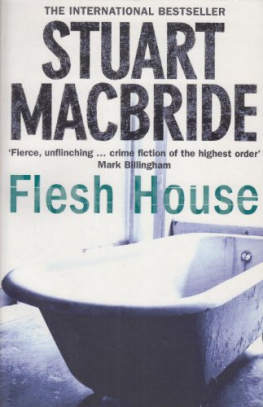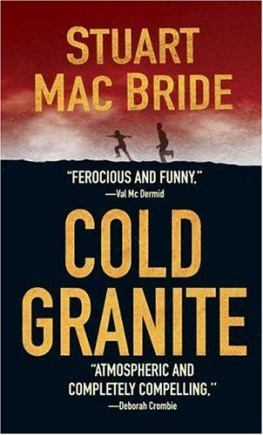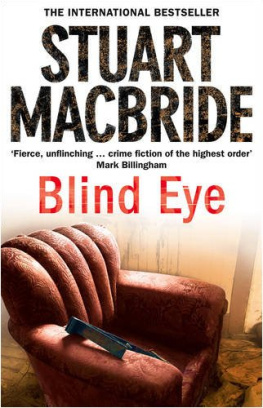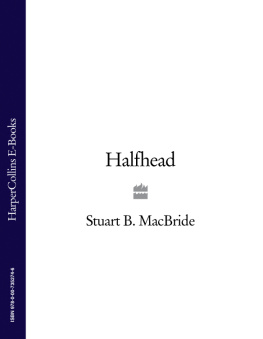TheLIVESSeries
JAMES CONNOLLYLorcan Collins
MICHAEL MALLIN Brian Hughes
JOSEPH PLUNKETT Honor O Brolchain
EDWARD DALYHelen Litton
SEN HEUSTONJohn Gibney
ROGER CASEMENTAngus Mitchell
SEN MACDIARMADABrian Feeney
THOMAS CLARKEHelen Litton
AMONN CEANNTMary Gallagher
THOMAS MACDONAGHShane Kenna
WILLIE PEARSERoisn N Ghairbh
CON COLBERTJohn OCallaghan
JOHN MACBRIDEDonal Fallon
MICHAEL OHANRAHANConor Kostick
THOMAS KENTMeda Ryan
PATRICK PEARSERun ODonnell
DONALFALLON AUTHOR OF 16LIVES: JOHN MACBRIDE
Donal Fallon is a lecturer and historian based in Dublin. Co-founder of the popular social history website Come Here To Me, his previous publications include The Pillar: The Life and Afterlife of the Nelson Pillar (New Island, 2014). He is currently completing a PhD on republican commemoration and memory in 1930s Ireland.
LORCAN COLLINS SERIES EDITOR
Lorcan Collins was born and raised in Dublin. A lifelong interest in Irish history led to the foundation of his hugely-popular 1916 Walking Tour in 1996. He co-authored The Easter Rising: A Guide to Dublin in 1916 (OBrien Press, 2000) with Conor Kostick. His biography of James Connolly was published in the 16 Lives series in 2012. He is also a regular contributor to radio, television and historical journals. 16 Lives is Lorcans concept and he is co-editor of the series.
DR RUN ODONNELL SERIES EDITOR
Dr Run ODonnell is a senior lecturer at the University of Limerick. A graduate of University College Dublin and the Australian National University, ODonnell has published extensively on Irish Republicanism. Titles include Robert Emmet and the Rising of 1803, The Impact of 1916 (editor), Special Category, The IRA in English prisons 19681978 and The OBrien Pocket History of the Irish Famine. He is a director of the Irish Manuscript Commission and a frequent contributor to the national and international media on the subject of Irish revolutionary history.
To my parents, Las and Maria. I owe so much to you both
As the 16 Lives series nears its conclusion, I want to thank Lorcan Collins and Ruan ODonnell for inviting me to participate in this exciting project. The series of books is a very meaningful contribution, and indeed a lasting one, to the centenary of the 1916 rebellion.
Historians can only hope to add to the existing body of work on any subject, and in the case of Major John MacBride, a few researchers deserve particular praise for the works from which this study drew upon. Firstly, Donal P. McCracken has done hugely important work on the Irish and the Second Boer War, and indeed on the history of the Irish Diaspora in South Africa. Anthony J. Jordan has brought important primary source materials on MacBride to the public awareness, and has drawn attention to the presence of the MacBride papers in the National Library of Ireland, when they were discovered hidden away in the papers of veteran Fenian Fred Allan. The Cathair na Mart journal, which celebrates the local history of Westport and its environs, has also played an important role in telling the story of the MacBride family.
I owe enormous gratitude to all at The OBrien Press, and to Aoife Barrett of Barrett Editing. Her insights and hard work played no small part in shaping this book. My family have been very helpful and supportive throughout, as they always are, and the encouragement of my parents has always driven me forward.
The staff at various archival institutions and libraries, in particular the Dublin City Library and Archive, the National Library of Ireland and the National Archives of Ireland, continue to do great work in the face of endless cutbacks to their services. It is a joy to research history in Ireland when these institutions, and others like them, are in the hands of people who are passionate about the collections they hold. Long may that stay the case.
My co-workers (or co-walkers) at Historical Walking Tours of Dublin deserve mention. It is a joy to work alongside people who are passionate about history. I am eternally grateful to Tommy Graham for taking me on. Likewise, Trevor White and all in The Little Museum of Dublin deserve thanks for the great support they have shown to me. Ciarn Murray and Sam McGrath of the Come Here To Me website, which I co-founded, are two of the best friends anyone could ask for and keepers of Dublins history in their own way.
Lastly, my partner Aoife deserves a special mention. She has listened to me talk of nothing but Boers, Fenians, poets and rebellion for quite some time now. She is my anchor, and brings me great joy in life.
Go raibh maith agaibh go lir.
184551. The Great Hunger in Ireland. One million people die and over the next decades millions more emigrate.
1858, March 17. The Irish Republican Brotherhood, or Fenians, are formed with the express intention of overthrowing British rule in Ireland by whatever means necessary.
1867, February and March. Fenian Uprising.
1870, May. Home Rule movement founded by Isaac Butt, who had previously campaigned for amnesty for Fenian prisoners.
187981. The Land War. Violent agrarian agitation against English landlords.
1884, November 1. The Gaelic Athletic Association founded immediately infiltrated by the Irish Republican Brotherhood (IRB).
1893, July 31. Gaelic League founded by Douglas Hyde and Eoin MacNeill. The Gaelic Revival, a period of Irish Nationalism, pride in the language, history, culture and sport.
1900, September.Cumann na nGaedheal (Irish Council) founded by Arthur Griffith.
190507.Cumann na nGaedheal, the Dungannon Clubs and the National Council are amalgamated to form Sinn Fin (We Ourselves).
1909, August. Countess Markievicz and Bulmer Hobson organise nationalist youths into Na Fianna ireann (Warriors of Ireland) a kind of boy scout brigade.
1912, April. Asquith introduces the Third Home Rule Bill to the British Parliament. Passed by the Commons and rejected by the Lords, the Bill would have to become law due to the Parliament Act. Home Rule expected to be introduced for Ireland by autumn 1914.


